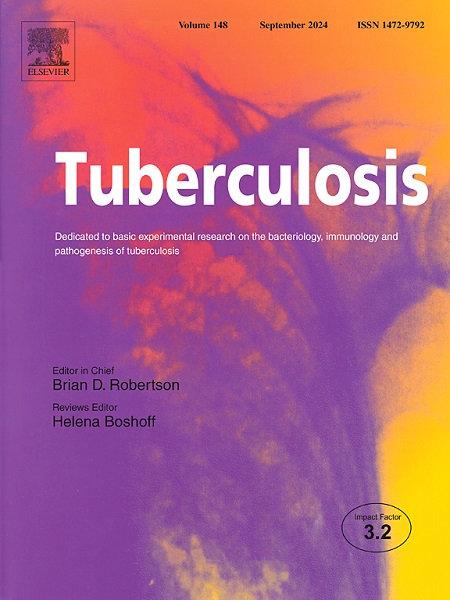Whole-genome sequencing-based surveillance system for Mycobacterium tuberculosis in Portugal
IF 2.9
3区 医学
Q3 IMMUNOLOGY
引用次数: 0
Abstract
To improve TB surveillance and diagnosis, the Portuguese National Reference Laboratory (NRL) began implementing whole-genome sequencing (WGS) for all RR/MDR-TB cases in 2019. Since 2020, this approach has been expanded to indiscriminately include all received isolates. We describe the current WGS-based surveillance system in Portugal, framed in prospective and retrospective data (n = 1171), upgraded for antimicrobial resistance (AMR) prediction and epidemiological analysis. This system relies on three main steps: QC/QA and contamination assessment, with a novel data filtering step; genotyping and AMR prediction; and dynamic SNP-based approach, maximizing variable sites under analysis. While lineage 4 was the most prevalent (84.3 %) followed by lineage 2 (9.1 %), less common EU/EEA sub-lineages (e.g., lineages 3 and 6) showcased cross-border transmissions. Molecular clusters (n = 157) displayed distinct AMR profiles and diverse possible epidemiological contexts. Among the pipeline upgrades, we highlight: i) the novel filtering step that allowed the improvement of 123 out of 128 contaminated samples; ii) tolerating missing data per site more than doubled core variable site resolution; iii) automatic maximization of shared variable sites for in-depth cluster analysis, key for consolidating genetic links in epidemiological investigation. This study highlights the importance of sustained prospective genomic surveillance towards strengthening TB management and diagnosis in Portugal.
基于全基因组测序的葡萄牙结核分枝杆菌监测系统。
为了改善结核病监测和诊断,葡萄牙国家参考实验室(NRL)于2019年开始对所有耐药/耐多药结核病病例实施全基因组测序(WGS)。自2020年以来,这一方法已扩大到不分青红皂白地包括所有收到的分离株。我们描述了葡萄牙目前基于wgs的监测系统,该系统以前瞻性和回顾性数据(n = 1171)为框架,升级为抗菌素耐药性(AMR)预测和流行病学分析。该系统依赖于三个主要步骤:QC/QA和污染评估,具有新颖的数据过滤步骤;基因分型和抗菌素耐药性预测;和动态的基于snp的方法,最大限度地分析可变位点。虽然谱系4最普遍(84.3%),其次是谱系2(9.1%),但不太常见的欧盟/欧洲经济区子谱系(例如谱系3和6)显示出跨境传播。分子簇(n = 157)显示出不同的AMR谱和不同的可能流行病学背景。在管道升级中,我们强调:i)新的过滤步骤可以改善128个污染样本中的123个;Ii)容忍每个站点丢失的数据超过核心可变站点分辨率的两倍;共享变量位点的自动最大化用于深度聚类分析,这是巩固流行病学调查中遗传联系的关键。这项研究强调了持续的前瞻性基因组监测对加强葡萄牙结核病管理和诊断的重要性。
本文章由计算机程序翻译,如有差异,请以英文原文为准。
求助全文
约1分钟内获得全文
求助全文
来源期刊

Tuberculosis
医学-呼吸系统
CiteScore
4.60
自引率
3.10%
发文量
87
审稿时长
49 days
期刊介绍:
Tuberculosis is a speciality journal focusing on basic experimental research on tuberculosis, notably on bacteriological, immunological and pathogenesis aspects of the disease. The journal publishes original research and reviews on the host response and immunology of tuberculosis and the molecular biology, genetics and physiology of the organism, however discourages submissions with a meta-analytical focus (for example, articles based on searches of published articles in public electronic databases, especially where there is lack of evidence of the personal involvement of authors in the generation of such material). We do not publish Clinical Case-Studies.
Areas on which submissions are welcomed include:
-Clinical TrialsDiagnostics-
Antimicrobial resistance-
Immunology-
Leprosy-
Microbiology, including microbial physiology-
Molecular epidemiology-
Non-tuberculous Mycobacteria-
Pathogenesis-
Pathology-
Vaccine development.
This Journal does not accept case-reports.
The resurgence of interest in tuberculosis has accelerated the pace of relevant research and Tuberculosis has grown with it, as the only journal dedicated to experimental biomedical research in tuberculosis.
 求助内容:
求助内容: 应助结果提醒方式:
应助结果提醒方式:


